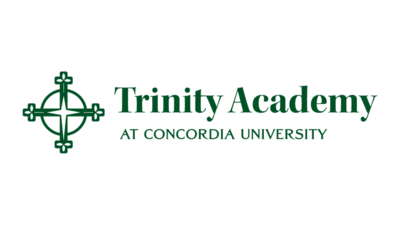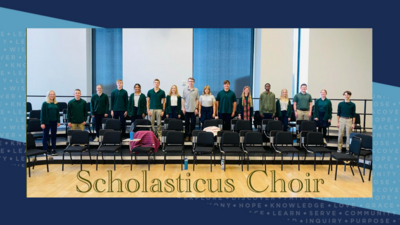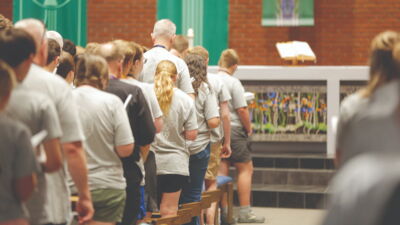Inside the Institutes: Trinity Academy serves as one of Concordia Nebraska’s institutes, makes classical liberal arts education accessible

Trinity Academy at Concordia University, Nebraska is one of the university’s institutes, which provide outreach, service and educational efforts that align and advance the university’s mission and vision by engaging audiences beyond the campus while serving as a resource to the church at large. It provides a low-cost option for high school students in Seward and surrounding communities to receive a holistic, faith-based classical liberal arts education that encourages them to seek truth, goodness and beauty.
Concordia Nebraska Professor of English Dr. Gabriel Haley is the headmaster of Trinity Academy, many of whose teachers also serve as professors at the university. He said that Trinity's mission is to provide students with a well-rounded high school education that emphasizes faith and virtue.
“As a classical Lutheran high school, TAC’s mission is to assist parents in the cultivation of knowledge, self-discipline and virtue in their children by offering a classical liberal arts education, involving the study of foundational sources within an integrated curriculum that encourages students to pursue truth, goodness and beauty,” he said.
Trinity Academy received approval as an institute of Concordia Nebraska in 2022 and started with its first cohort of four students during the 2023-24 academic year. This year, eight students attend the school and it’s likely that enrollment will double again for the 2025-26 school year. The school’s vision is to enroll 10 students per grade, with a total enrollment of 40.
The school’s mission is to assist parents in the cultivation of knowledge, self-discipline and virtue in their children by offering a classical liberal arts education, involving the study of foundational sources within an integrated curriculum that encourages students to pursue truth, goodness and beauty.
“The momentum is exciting,” Haley said. “We keep building a longer list of interested families for years to come.”
Concordia Nebraska’s Director of University Institutes Deb Jurchen said that Trinity Academy offers uniquely personal and Lutheran education for each of its students.
“It’s a small, very in-depth school where the students are going to get personalized education with its foundation in classical education,” she said. “The foundation is on God’s Word, and Trinity Academy is another option for students in our community to have a Lutheran education.”
According to Haley, Trinity Academy represents a return to Concordia Nebraska’s roots: in 1894, the university was founded as a small Lutheran high school, enrolling just 13 students. Now, as the university has expanded to serve over 2,000 undergraduate and graduate students, the eight high schoolers attending Trinity Academy are introduced to Concordia in a similar way to its very first students.
“[Trinity Academy] serves families who want a Christ-centered education,” said Haley. “As a Lutheran school, we make sure the students read and understand the Bible well and are involved in daily prayer and devotions – most importantly, the students are regularly encouraged to seek Christ first in all things.”
As an institute, Trinity Academy must also align with five primary guiding principles. Therefore, the microschool must align with the mission and vision of Concordia Nebraska and intentionally engage its students as well as fill a recognized need within and serve as a resource to the LCMS church at large.
Haley said that one way Trinity Academy abides by this guidance is by providing field experience and student teaching opportunities for Concordia undergraduates. The academy’s students also represent seven surrounding towns, allowing it to reach populations beyond the Seward community.
“The way Trinity Academy has been able to support families in multiple towns has been amazing,” said Haley. The academy also addressed a very specific need in the Seward area.
“K-8 and college are already well-served in our town [regarding Lutheran education], but there wasn’t a high school that offered a Christ-centered education,” Haley said.
Finally, Trinity Academy is a classical school – so what does this mean, and why should parents consider sending their children to receive a classical liberal arts education? Haley said that, at its core, classical education is a new name for an established, traditional approach to schooling.
“In short, it means that Trinity Academy emphasizes that there is objective truth and goodness, and that an education at Trinity will include a great books curriculum, foundational sources and an intention to build virtues and good habits,” he said. “Classical education is also known as a traditional liberal arts education: it’s all about cultivating an appreciation of how learning is not just useful; it’s also edifying.”
Haley said that Trinity appreciates the continued prayers of the community as it continues to grow and further its mission. Monetary donations are also appreciated and interested donors can visit the school’s website for more information. Tuition is designed to be affordable for families, with discounted rates available for those enrolling multiple children at the school concurrently.
“We aim for an interdisciplinary, liberal arts education, so that students are enriched by the many wonders of God’s created world and understand how they hold various vocations in life: including their role in a family, in a church, as a neighbor and as a public citizen,” Haley said.
Institutes at Concordia Nebraska provide outreach, service and educational efforts that align with and advance the university’s mission and vision by engaging audiences beyond campus while serving as a resource to the church at large. Learn more about institutes here.
Interested in Institutes at Concordia University, Nebraska?


